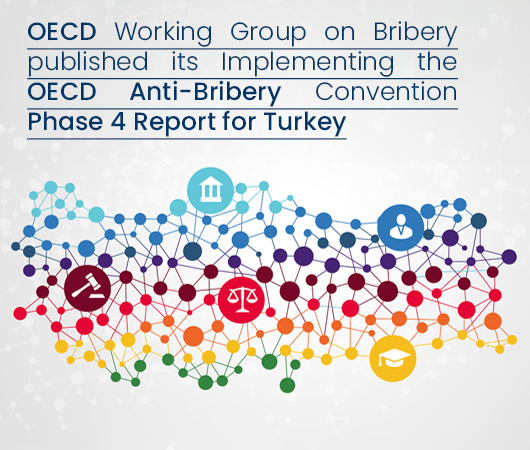In these days when we see a lot of news about Turkey’s removal from the Financial Action Task Force grey list, very little has been said about the OECD Phase 4 evaluation of Turkey’s implementation of the OECD Convention on Combating Bribery of Foreign Public Officials in International Business Transactions (the “OECD Convention”). The report, adopted by the OECD Working Group on Bribery on 13 June 2024, evaluates and makes recommendations on Turkey’s implementation of the OECD Convention (the “Report”)[1]. Turkey’s last full Working Group evaluation in Phase 3 was 10 years ago and yielded 27 recommendations. By October 2022, Turkey had not progressed on four outstanding Phase 3 issues that were the focus of the high-level mission, namely corporate liability, whistleblower protection, prosecutorial independence from improper influence, and foreign bribery enforcement. Eventually, the evaluation team for Phase 4 carried out onsite visits in Turkey and collected oral and written information about Turkish law and practice. The OECD’s thoughts about Turkey can be summarized with the following word, which is used about 90 times in the Report: Concern! Most of the commentaries state that the lead examiners are extremely concerned with not only Turkey’s foreign bribery enforcement but also its overall implementation of the OECD Convention. To put this in numbers, the Report mentions that “there have been 23 known allegations of foreign bribery committed by Turkish individuals and/or companies since 2000 when Türkiye became a Party to the Convention. None has produced a conviction. Almost two-thirds of the allegations have not been investigated at all. Many of the remaining one-third have not been investigated proactively or thoroughly. None has resulted in prosecution since Phase 3”.[2]
Following the methodology of the Report, we can summarize the key points as follows:
- Detecting the foreign bribery offence: Turkey needs to;
- develop a government-wide national strategy that includes prevention, detection, awareness-raising, and enforcement,
- raise the awareness of and train relevant public officials on detecting and reporting foreign bribery,
- encourage law enforcement authorities to proactively gather information from diverse sources to increase the detection of foreign bribery,
- designate a specific unit in the Public Prosecutor’s Office with the responsibility for effectively and systematically monitoring domestic and foreign media for allegations of foreign bribery committed by Turkish citizens or companies,
- enact comprehensive legislation to protect and provide remedies regarding reporting and whistleblowing of foreign bribery,
- set out a clear procedure and channel for Ministry of Foreign Affairs officials to report foreign bribery allegations and forward such reports to Turkish law enforcement,
- to encourage companies to self-reporting,
- raise awareness of foreign bribery within the private sector, particularly among companies that operate in sectors or countries with a high risk of foreign bribery, including micro, small, or medium-sized enterprises and state-owned or controlled enterprises.
- Enforcement of foreign bribery and related offenses, Turkey is recommended to;
- assign primary responsibility for co-ordinating or investigating foreign bribery cases to a specific prosecutorial unit,
- train prosecutors to emphasize their legal authority to open a foreign bribery investigation ex officio whenever information is sufficient.
- take a proactive approach to the investigation and prosecution of foreign bribery as well as international cooperation in foreign bribery cases,
- take actions regarding judicial and prosecutorial independence,
- train judges, prosecutors, and police responsible for foreign bribery cases.
- Responsibility of legal persons, Turkey is recommended to;
- consider making non-trial resolutions (such as deferred and non-prosecution agreements) available in foreign bribery cases,
- amend its legislation to allow fines to be imposed against natural persons for foreign bribery in addition to imprisonment,
- draw the attention of prosecutors to the importance of seeking confiscation against natural persons in foreign bribery cases,
- amend the legislation to ensure that corporate liability for foreign bribery is not restricted to cases where the natural person perpetrator is prosecuted or convicted,
- ensure that legal persons cannot avoid liability or sanctions for foreign bribery and related offenses by restructuring, or otherwise altering their corporate identity,
- enhance the use of Misdemeanour Law Art. 43/A[3], especially in foreign bribery cases; and
- train relevant prosecutors and judges on corporate liability and sanctions for foreign bribery, including the application of the provision on corporate fine.
In the end, The Working Group welcomes Turkey’s efforts since Phase 3 to implement the OECD Convention and refers to several good practices and positive achievements by Turkey especially for anti-money laundering measures. However, despite these achievements, there is a long list of recommendations and follow-up issues, of which you see only a small selection above. Our situation is very similar to the Phase 4 Report for Greece[4] (the word “concern” is used approximately 100 times in that report”). Greece’s Two-Year Written Follow-Up Report came out around the same time as Turkey’s Report. The Working Group concludes that of Greece’s 49 recommendations 23 have been fully implemented; 15 have been partially implemented and 11 have not been implemented[5]. These publications show that countries should feel the OECD Working Group on their neck like a monitoring officer in an FCPA case.
[1]https://www.oecd.org/en/publications/implementing-the-oecd-anti-bribery-convention-phase-4-report-turkiye_2db5c502-en.html
[2] Page 60 of the Report.
[3] Turkey provides corporate liability for foreign bribery principally through Misdemeanour Law Art. 43/A. The Report states that there is no information on whether sanctions for bribery imposed in practice are sufficient. As explained in section C.4 at p. 56, Misdemeanour Law Art. 43/A has not been applied in domestic or foreign bribery cases. In 2021-2023, a fine was imposed in only one case under Misdemeanour Law Art. 43/A (TRY 20 000 (EUR 678) for a fraud offence).
[4] OECD (2022), Implementing the OECD Anti-Bribery Convention Phase 4 Report: Greece, Implementing the OECD Anti-Bribery Convention, OECD Publishing, Paris.
[5] OECD (2024), Implementing the OECD Anti-Bribery Convention Phase 4 Report Two-Year Written Follow-Up Report: Greece, OECD Publishing, Paris.
Yazı: Filiz Toprak Esin – Karaduman & Esin Law Firm
Note: The opinions and comments in the articles belong to the author or authors and do not reflect the opinions of the Ethics and Reputation Association on the subject.

